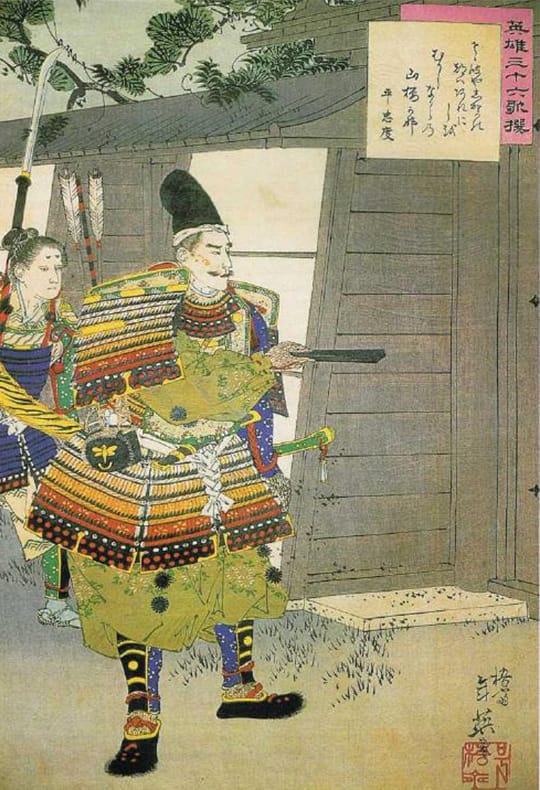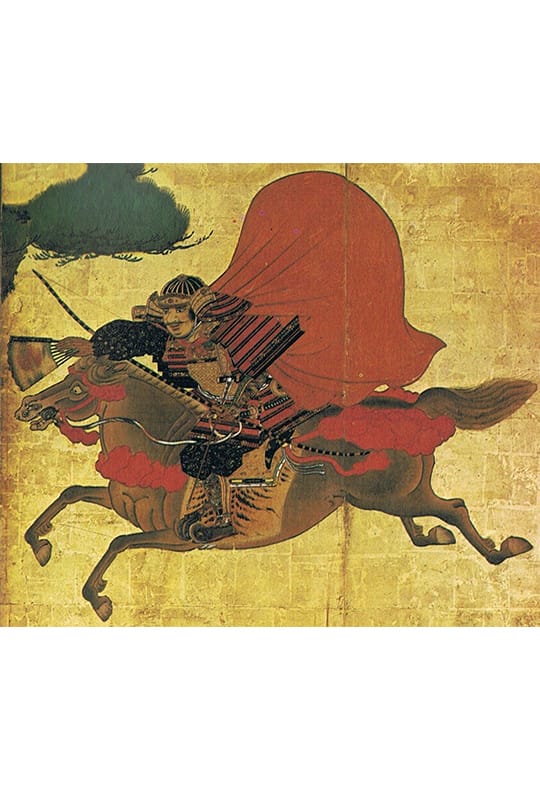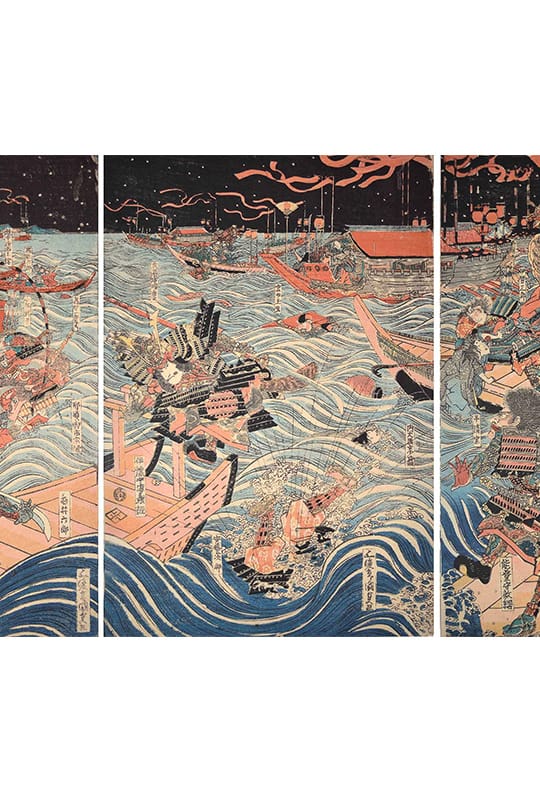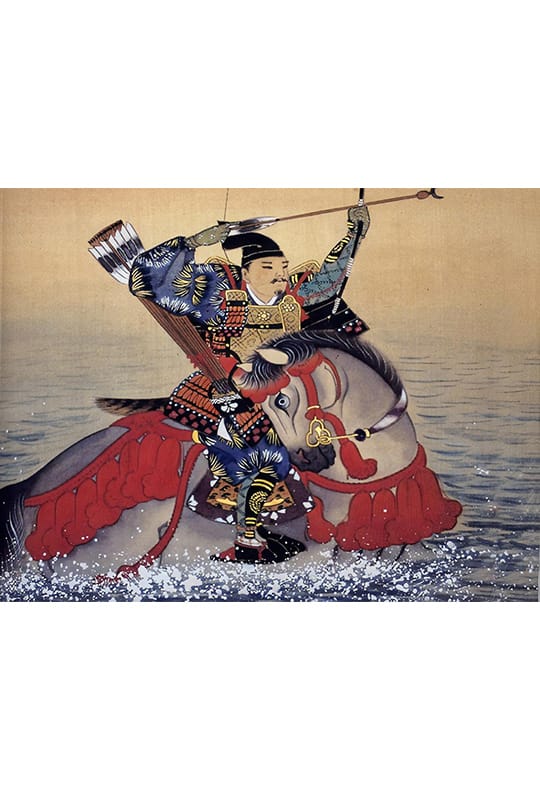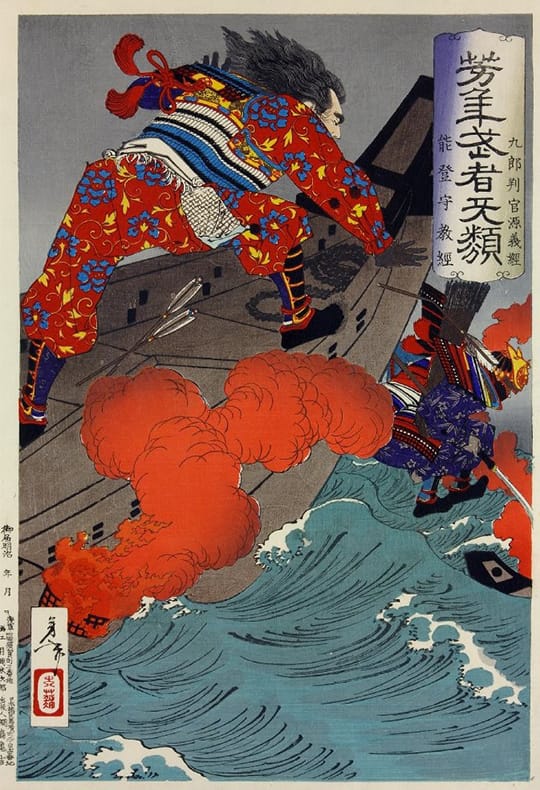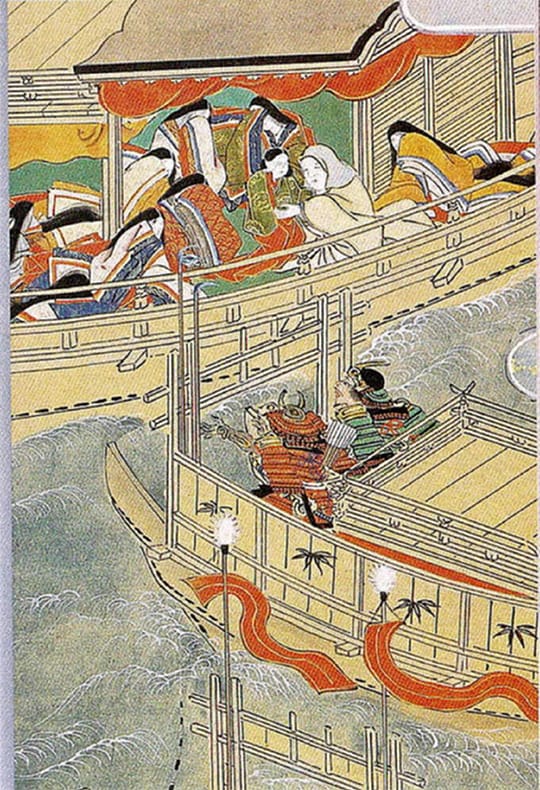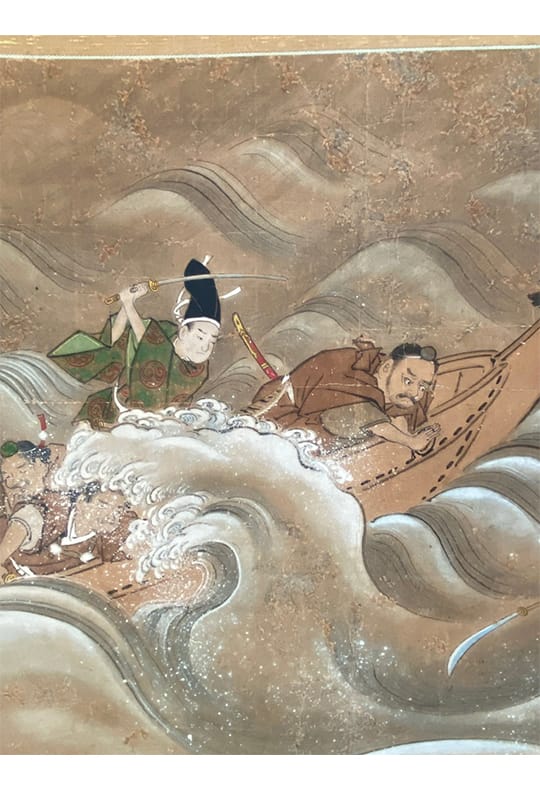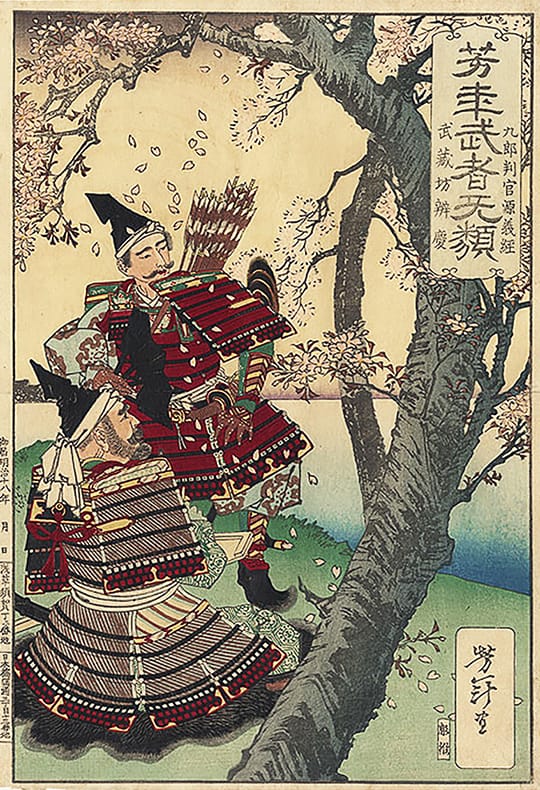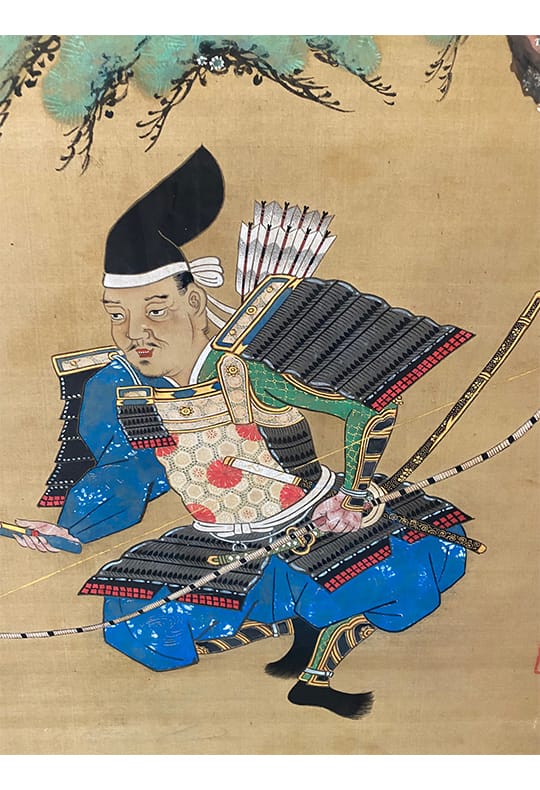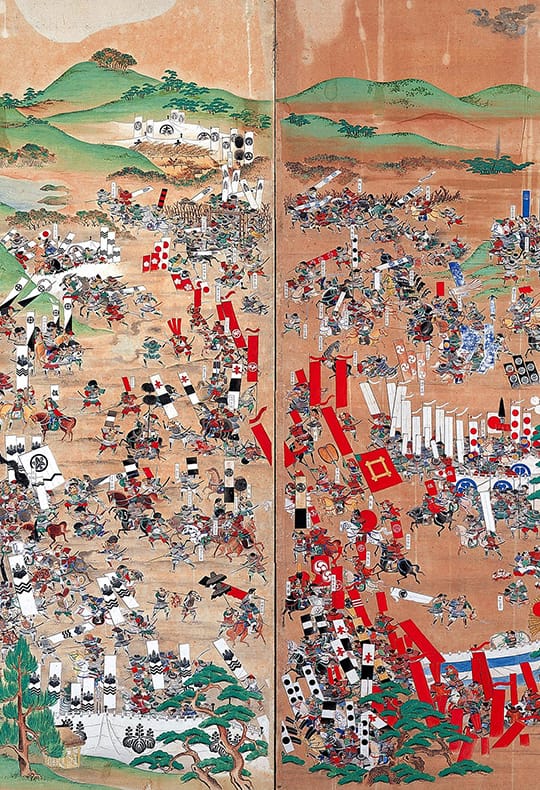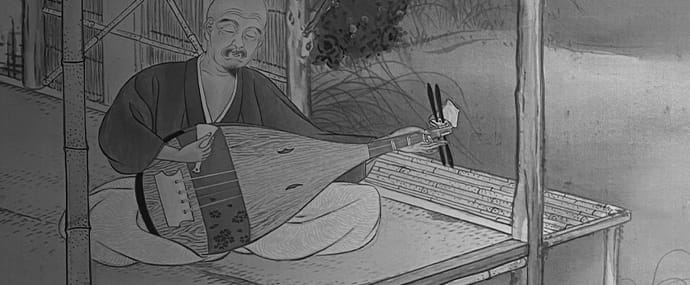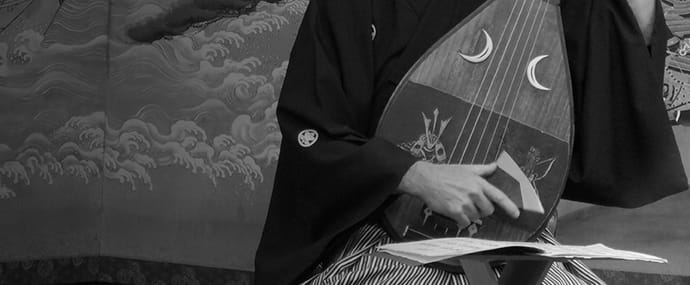
ataka
安宅
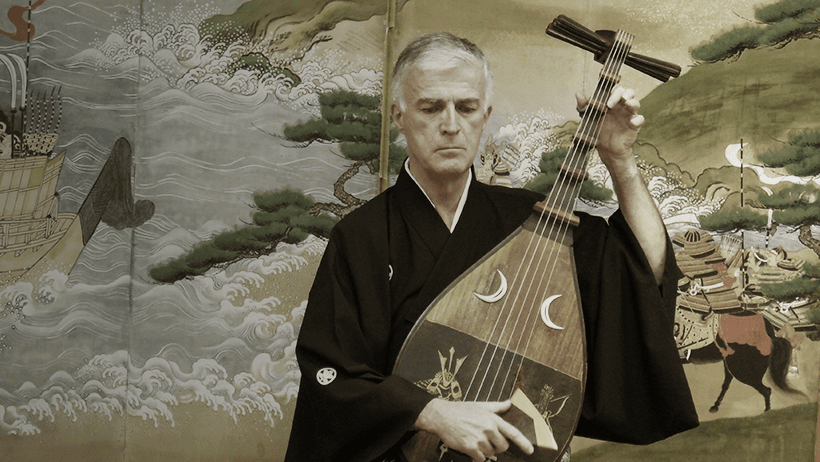
Introduction
MINAMOTO no Yoshitsune’s success in destroying the ruling HEIKE clan was the envy of others who then spread slanderous rumours of his disloyalty. His half-brother, Yoritomo, the head of the MINAMOTO clan and the first Shogun in Kamakura, believed these rumours to be true and persecuted Yoshitsune. It is said that in the first month of 1185, Yoshitsune parted with his consort Shizuka in Yoshino and finally reached Michinoku (Tōhoku) in the second month of 1187, where he took refuge. In the period between these two dates, it is clear that he hid on Mt. Hiei near Kyoto, and then in Nara, but the details remain vague. In literature, however, there are numerous descriptions of his escape to Michinoku, the most famous of these being the episode at the Ataka barrier described in this piece.
The version given in the chikuzen biwa text adheres closely to the plot of the Noh play by the same name; this, however, is not the oldest version of the story. In the Gikeiki ( The Chronicles of Yoshitsune, written in 1350), the story differs considerably from the Noh and chikuzen biwa versions. In this earlier work, Benkei indeed tricks Togashi, but not by reading a ‘subscription list’. It is also unclear where the Gikeiki version takes place, the only reference being “a place called Togashi in Kaga country”. Benkei’s beating of Yoshitsune also occurs at a completely different location. The Noh version, on which the biwa text is based, summarises the Gikeiki story, but freely expands it with other episodes.
In 1840, the Noh piece Ataka was rearranged as a Kabuki play with the new title of Kanjinchō, and premiered by ICHIKAWA Danjūrō VII. The biwa text was influenced by this latter rendition of the famous episode.
Synopsis
Yoshitsune leaves Kyoto with a few close retainers under Benkei’s guidance. They form a group of twelve fugitives disguised as yamabushi. They move towards Michinoku where Yoshitsune expects to find refuge. On their way, they arrive at the barrier of Ataka that Yoritomo, the new ruler in Kamakura, had built. Yoritomo is attempting to capture his half-brother, Yoshitsune, whom he suspects of disloyalty. Togashi, the guard in charge of the barrier, had heard that Yoshitsune is fleeing with his closest retainers disguised as yamabushi and becomes suspicious. Benkei insists that his group is on a journey to collect money for the rebuilding of the recently burnt Tōdaiji temple in Nara. Togashi is unconvinced and asks Benkei first to tell him about the origins and special features of yamabushi. Pleased with Benkei’s excursus, he then questions him about his subscription list. Benkei, of course, has no such document, but pulls out an ordinary paper scroll from his luggage. He then improvises the reading of a highly formal introduction to his funding task in a thunderous voice frightening everybody. After finishing his performance, Togashi allows the group to pass.
Then, however, one of Togashi’s aides becomes suspicious about a luggage carrier who very much resembles the description of the wanted general. This low class fellow is indeed Yoshitsune in disguise. The group is immediately ordered to stop. Benkei makes a display of great anger about his “servant,” and in order to prove that the luggage carrier is not Yoshitsune, harshly scolds him and beats him with his stick. As it was unthinkable in feudal Japan that a retainer would beat his lord, Togashi is convinced of the luggage carrier’s identity and gives again the order to let the yamabushi pass
After a while the group reaches a shore where they rest. There Benkei falls on his knees in front of Yoshitsune apologizing for his rudeness. Yoshitsune, however, forgives him understanding the reason of the beating. In the meantime, Togashi’s aids arrive with bottles of sake to bid farewell to the group. Benkei sings and dances joyfully and the group moves on towards Michinoku.
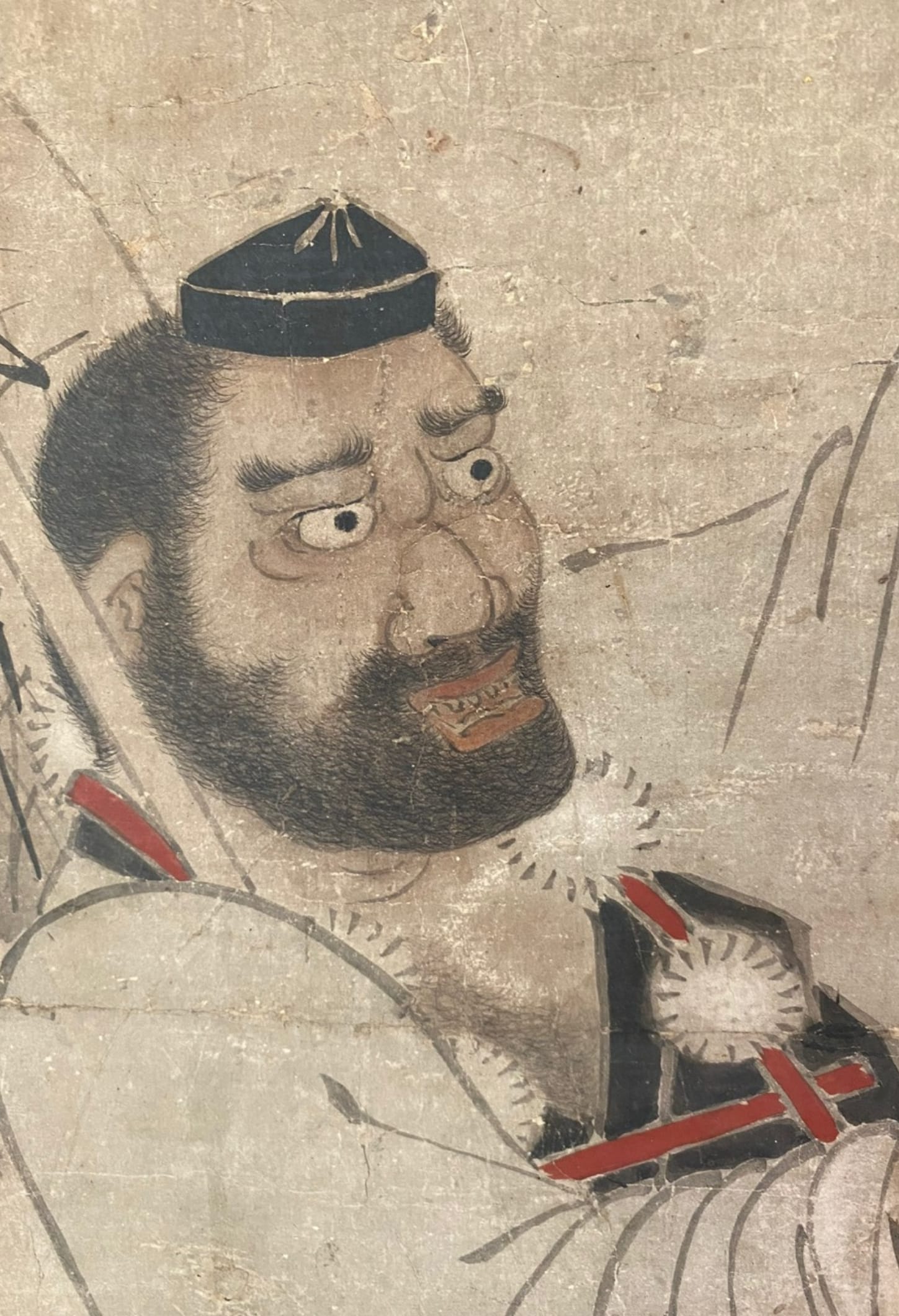
Lyrics
-
1. The departing geese ignore the flowering Capital, Die Gänse fliegen fort – die blühend schöne Kaiserstadt verlassend
Hana o misutete yuku kari no 花を見捨てゝ行く雁の
-
2. and hurry to the village where no flowers are. eilen sie zum schlichten Dorf, wo keine Blüte ist.
hana naki sato ni isoguran 花なき里に急ぐらん
-
3. The companions call to each other as they bind Gefährten tauschten Rufe, banden an den Reisekleidern
tomo yobikawashi tabigoromo 友呼び交し旅衣
-
4. the sleeves of their tear soaked traveling clothes. ihre taugenetzten Ärmel hoch.
tsuyukeki sode o shioritsutsu 露けき袖をしをりつゝ
-
5. Yoshitsune is on his way with twelve retainers. Mit zwölf Getreuen war Yoshitsune zur Reise aufgebrochen;
Hōgan shūjū jūninin 判官主従十二人
-
6. Benkei leads the group, angeführt von Benkei folgten ihm
sono sendatsu wa Benkei nite 其の先達は弁慶にて
-
7. followed by KAMEI, KATAOKA, ISE, SURUGA, and the others KAMEI, KATAOKA, ISE, SURUGA (und die anderen)
KAMEI KATAOKA ISE SURUGA 亀井片岡伊勢駿河
-
8. disguised as yamabushi als yamabushi gut verkleidet.
yamabushi sugata ni mi o yatsushi 山伏姿に身をやつし
-
9. It was the evening of the tenth day of the second month. In der Nacht des10. Tags im 2. Monat
koro wa kisaragi tōka no yo 頃は如月十日の夜
-
10. Far from the brilliant Capital leuchtete der Mond hell über Kyōto,
tsuki no miyako o ochikochi no 月の都を遠近の
-
11. they wandered in the moonlight, als sie traumverloren auf den Pass von Ōzaka gelangten
yume zo na ni ou Ōzaka no 夢ぞ名に負ふ逢坂の
-
12. over the pass of Ōzaka, und wie Wasser von des Passes Scheide glitten,
seki no shimizu no yukusue ni 関の清水の行末に
-
13. and like the flowing water they moved einem Flusse ähnlich laufend hin zum vorbestimmten Ziel.
sasuya nagare no minarezao さすや流れの水馴棹
-
14. from Kaizu in the direction of Mikuni towards Koshiji, Kaizu, Mikuni und Koshijigata passierten sie in Eile.
Kaizu Mikuni mo Koshijigata 海津三国も越路方
-
15. where they reached the Ataka barrier. und erreichten schließlich Ataka, die Grenzwacht.
Ataka no seki ni zo tsukinikeru 安宅の関にぞ着にける
-
16. T: “Hey, you monks there, T: „He, ihr Mönche
nōnō sorenaru yamabushitachi 喃々それなる山伏達
-
17. this is a barrier.” Hier ist eine Sperre!“
koko wa seki nite sōrō zo こゝは関にて候ぞ
-
18. B: “I understand. B: „Das nehm‘ ich zur Kenntnis.
uketamawari sōrō 承り候
-
19. For the Tōdaiji temple in Nara, Doch wir führen für den Bau des Tempels Tōdaiji in Nara
ware wa Nanto Tōdaiji konryū no tame 吾は南都東大寺建立の為
-
20. we are raising funds throughout the country. eine Spendeliste und sind unterwegs in vielen Ländern.
kuniguni e kanjin no 国々へ勧進の
-
21. We are the monks in charge of the Hokuroku subscription.” Mönche sind wir auf der Reise, Hokuroku ist das Ziel.“
Hokurokudō o uketamawaru kyakusō nite sōrō 北陸道を承はる客僧にて候
-
22. T: “This is a laudable cause in these times, T: „In diesen Zeiten heischt dies zwar Bewunderung,
chikagoro shushō no itari ni sōraedomo 近頃殊勝の至りに候へども
-
23. but Yoritomo and Yoshitsune doch Yoritomo steht mit seinem Bruder Yoshitsune
Yoritomo Yoshitsune onkyōdai 頼朝義経御兄弟
-
24. have fallen in discord. in schlechtem Einvernehmen.
onnaka fuwa to narase tamai 御仲不和とならせ給ひ
-
25. It is rumored that Yoshitsune in a company of twelve Yoshitsune soll mit seinen zwölf Getreuen
Hōgandono shūjū jūninin 判官殿主従十二人
-
26. is seeking the protection of Hidehira in Mutsu. im Verlass auf Hidehira, der in Mutsu lebt,
Mutsu Hidehira o tayoritamai 陸奥秀衡を頼り給ひ
-
27. They are traveling as false monks in einer Gruppe falscher Mönche
tsukuri yamabushi to narite 作り山伏となりて
-
28. in the direction of Michinoku. sich nach Michinoku wenden.
Michinoku e gogekō no yoshi みちのくへ御下向の由
-
29. Therefore Yoritomo ordered Deshalb hat Yoritomo befohlen,
Kamakuradono no genmei ni yori 鎌倉殿の厳命により
-
30. new barriers to be built.” dass man neue Sperren baue.“
niizeki mōkete sōrōnari 新関設けて候なり
-
31. B: “But this is ridiculous! B: „Das verblüfft mich aber!
sate koso shōshi さてこそ笑止
-
32. Won’t you let honest monks pass the barrier?” Wollt Ihr echte Mönche gar am Weiterziehen hindern?“
makoto no yamabushi o mo todome sōrō ya 真の山伏をも止め候や
-
33. T: “Cease this pointless talk, T : „Ah, zu verhandeln gibt‘s hier nichts,
ara muzukashiya mondō muyaku あらむづかしや問答無益
-
34. I will not allow a single man to pass!” wir lassen keinen durch!“
ichinin mo tōsu koto makarinaran 一人も通すこと罷りならん
-
35. When Benkei heard this Als Benkei diese strengen Worte hörte,
kaku to kiku yori Benkei wa かくと聞くより弁慶は
-
36. it seemed they were in danger of losing their lives. schien die Lage ihm gefährlich,
ichigo no fuchin daiji no seto to 一期の浮沈大事の瀬戸と
-
37. He assembled all the monks und so scharte er die andern yamabushi um sich.
yamabushitachi o aiatsume 山伏達を相集め
-
38. rubbing his Buddhist rosary heavily rustling ,Sarasara’ rieb er seinen Rosenkranz,
juzu sarasara to oshimonde 珠数さらさらと押揉んで
-
39. and started to chant a final prayer. begann ein Schlussgebet zu intonieren.
saigo no inori o zo hajimekeru 最後の祈念をぞ始めける
-
40. T: “Guide, one moment, if you will, T: „Wartet, Führer, einen Augenblick,
shibaraku matareyo gosendatsu 暫く待たれよ御先達
-
41. I would like to ask you something: ich möchte Euch noch Fragen stellen:
koto no tsuide ni toimōsan 事の序に問ひ申さん
-
42. What is the origin of the yamabushi?” Was sind yamabushi, und von woher kommen sie?“
oyoso yamabushi no kiin na ika ni およそ山伏の起因ないかに
-
43. This question gave Benkei some hope. Da fühlte Benkei sich erleichtert.
Benkei ichiru no nozomi o e 弁慶一縷の望を得
-
44. B: “The origins of yamabushi B: „Nun, der Ursprung von uns yamabushi geht
somosomo yamabushi no ranshō to ippa 抑も山伏の濫觴といっぱ
-
45. start with the venerable Sanzōhōshi in China in China auf den Priester Sanzōhōshi zurück
morokoshi nite wa Sanzōhōshi 唐土にては三蔵法師
-
46. and in our country with Ennogyōja. und in unsrem Lande auf den Priester Ennogyōja.
wagachō nite wa Ennogyōja 我朝にては役の行者
-
47. Yamabushi, imitating the deity Fudō Myōō, Yamabushi nehmen sich die Gottheit Fudōmyōō zum Vorbild,
sono mi wa Fudōmyōō no son‘yō o katadori その身は不動明王の尊容をかたどり
-
48. are ascetics in the mountains sitzen unter Bäumen und auf Felsen wie Asketen –
noyama no sue ya jukasekijō 野山の末や樹下石上
-
49. who think of their austerities as dreams. nach Erleuchtung strebend, wenn sie meditieren.
kugyō o yume to satori tsutsu 苦行を夢とさとりつゝ
-
50. On their heads they wear a little cap Auf dem Haupte tragen sie ein Hütchen,
kōbe ni itadaku tokin koso 頭に戴く兜巾こそ
-
51. which symbolizes the Five Truths of Buddhism das als Kopfschmuck der ,Fünf Lehren Buddhas‘ gilt.
makoto ni gochi no hōkan nite まことに五智の宝冠にて
-
52. and its pleats refer to the Twelve Karmic Sources. Zwölf ist die Zahl der Falten und die Zahl der Karma-Inada.
jūni inne no hida o sue 十二因縁のひだをすえ
-
53. They wear the persimmon colored garment of the ‘Nine Worlds Mandala’, Khakifarben ist die Robe – wie das ,Neuner-Mandala‘.
kue mandara no kaki no suzukake 九重曼陀羅の柿の篠懸
-
54. their leg wrappings are the black of the ‘Eternal Womb Mandala’, Und schwarz sind Schenkelschoner – wie das ,Mandala des Mutterleibs‘.
taizō kokushoku no habaki o haki “胎蔵黒色の脛衣をはき
-
55. T: and as for the eight holes of their straw sandals? T: “Warum nur haben Strohsandalen denn acht Löcher?“
sate mata yatsume no waranji wa 扨又八つ目の草鞋は
-
56. B: they represent the ‘Eight-Petal-Lotus.’ B: „Damit stehen yamabushi auf der Blüte eines Lotos mit acht Blättern,
hachiyō renge o fumite tachi 八葉蓮華を踏みて立ち
-
57. on which they stand when aspiring to attain Buddhahood.” wenn ihr Geist erleuchtet ist.“
sokushinsokubutsu no arigatasa 即身即仏の有難さ
-
58. T: “How do they breathe?B: By inhaling ‘A’ and exhaling ‘Un’. T: “Wie ist es mit dem Atem“ B: „Nichts als A-UN, ein und aus!“
”ideiru iki wa a‘un no niji 出で入る息は阿呍の二字
-
59. T: “But if a yamabushi is wearing a religious garment T: „Wenn jedoch ein yamabushi sich so heilig kleidet
saredo hōe o matou mi ga されど法衣を纏ふ身が
-
60. with the cap of ‘Five Truths’ and the robe of ‘Karmic Sources,’ mit dem ,Hut der Lehren‘ und dem Kleid der Inada,
naniyue tokin suzukake ya 何故兜巾篠懸や
-
61. why does he carry a sword?” warum trägt er dann ein Schwert an seiner Seite?“
hatamata tachi o hakitsuru ya はた又太刀を佩きつるや
-
62. B: “The garment and the cap are like a warrior’s helmet and armor B: „Kleid und Kopfschmuck sind des Priesters Rüstung
suzukake tokin wa bushi no katchū 篠懸兜巾は武士の甲冑
-
63. and the sword is not a mere decoration. und das Schwert ist nicht zur Zierde da.
hakitaru tachi wa kagashi ni arazu 佩きたる太刀は案山子に非ず
-
64. This is a sword Das ist ein Schwert,
mida no riken no mune o kome 弥陀の利剣の旨を罩め
-
65. as powerful as the Buddhist Law. so machtvoll wie die Lehre Buddhas,
buppō hyōhō ni shōge o nasu 仏法平法に障碍をなす
-
66. We are fighting those who desecrate The Teaching, denn wir kämpfen damit nicht nur gegen böse, wilde Tiere,
akujū dokuja wa mōsu ni oyobazu 悪獣毒蛇は申すに及ばず
-
67. whether they are beasts or evil humans. sondern greifen alle an, die Buddhas Lehre schmutzig machen.
ōhō kegasu tomogara wa 王法瀆す徒は
-
68. If one evil creature is defeated, life for many others is saved. Mit nur einem gut geführten Schwertschlag gegen Schlechtes
issetsu tashō no ri ni yotte 一殺多生の利によって
-
69. Such a sword is this.” können wir viel Leben retten.“
tachidokoro ni kitte otosu 立ち処に斬って落す
-
70. T: “To fight living foes is one thing T: „Kämpfe gegen Lebendes ist eines,
manako ni saegiri katachi aru mono wa yoshi kiru tomo 眼に遮り形あるものはよし斬るとも
-
71. but what do you do against evil spirits?” doch wie geht ihr gegen Teufel und Dämonen vor?“
inki yōma wa nani o motte kirubeki ya 陰気妖魔は何を以て斬るべきや
-
72. B: “We fight them with the Nine Word Spell.” B: „Neun Zauberzeichen kennt der Shingon-Exorzismus.“
kuji shingon na motte setsudansu 九字真言な以て切断す
-
73. T: “To oppose such remarkable pilgrims T: „Wenn wir solche großen Priester
kakaru imijiki yamabushi o かゝるいみじき山伏を
-
74. and kill them here hier am Weiterziehen hindern
koko nite uchitome tamawan koto 此処にて打止め給はん事
-
75. would surely arouse the anger of Fudō Myōō und das Fudō Myōō erfährt,
Fudōmyōō no shōran 不動明王の照覧
-
76. and invite the punishment of the deity Yuya Gongen. dann wird er durch die Gottheit Yuya Gongen eine Strafe schicken,
Yuya gongen no mibachi no hodo 熊野権現の御罰の程
-
77. This indeed would be terrible”. die uns Angst und Schrecken bringt.“
ito osoroshiku sōrawan いと恐ろしく候はん
-
78. And so, the guardian of the barrier continued. Nun stellte Togashi noch eine andere Frage:
sekimori sarani kotoba o tsugi 関守更に言葉をつぎ
-
79. T: “If what you have told me is true, T: „Wenn dem ist, wie Ihr berichtet,
sareba sakihodo ōserareshi されば先程仰せられし
-
80. then show me the subscription documents for the Tōdaiji Temple. zeigt mir eure Unterlagen für die Tempel-Spenderliste.
Nanto Tōdaiji konryū no kanjin no shui 南都東大寺建立の勧進の主意
-
81. Quickly, quickly, read it to me, Schnell, schnell lest mir vor –
iza iza on‘yomi sōraekashi いざいざ御読み候へかし
-
82. I am ready to listen.” ich bin bereit zu hören.“
sekimori kore nite chōmonsen 関守これにて聴聞せん
-
83. Of course, he had no such document Benkei hatte keine Spendeliste,
motoyori kanjinchō no araba koso 固より勧進帳のあらばこそ
-
84. and therefor he took from his traveling box und so zog er aus dem Korb
oi no naka yori toriidasu 笈の中より取り出す
-
85. a simple scroll flugs eine Rolle, die noch unbeschrieben war
ōrai no makimono ikkan 往来の巻物一巻
-
86. and called it ‘the subscription book’. und nannte sie ‘Die Spendeliste’.
kanjinchō to nazuketsutsu 勧進帳と名づけつゝ
-
87. In a grandiose way, he unfurled the scroll and chanted thunderously: Groß war seine Aufroll-Geste, als er donnernd anhob:
oshiitadakite daionjō 押戴きて大音声
-
88. B: “As I ponder deeply, ever since B: „Denk ich tief und gründlich nach,
sore tsuratsura omonmireba 夫つらつら惟れば
-
89. the Founder of the Law (Gautama Buddha), like the autumn moon wie unser Meister (Gautama Buddha) im Licht des Herbstmonds
daion kyōshu no aki no tsuki wa 大恩教主の秋の月は
-
90. wrapped in clouds, entered the heaven of Nirvana in das Wolkenreich Nirwana entschwand
nehan no kumo ni kakure 涅槃の雲にかくれ
-
91. from the lengthy dream of life and death und uns damit den langen Traum bescherte von der langen Nacht
shōjichōya no nagaki yume 生死長夜の長き夢
-
92. and there were none who awakened from their delusions. des Lebens und des Tods – ein Traum, aus dem wir nie erwachen.
odorokasubeki hito mo nashi 驚かすべき人もなし
-
93. In the distant past, there was the reign Viele Jahre sind vergangen,
koko ni nakagoro mikado owashimasu 爰に中頃帝おはします
-
94. of the emperor, known as Shōmu Tennō. seit der Kaiser Shōmu unser Land regierte.
onna o Shōmu kōtei to nazuke tatematsuri 御名を聖武皇帝と名づけ奉り
-
95. When he lost his beloved consort Als jedoch die viel geliebte Gattin starb,
saiai no bujin ni wakare 最愛の夫人に別れ
-
96. the dark depths of his grief da litt er fürchterlich,
tsuibo yami gataku 追慕やみ難く
-
97. filled his eyes with teardrops. und endlos füllten seine Augen sich mit Tränen.
teikyū manako ni araku nanda tama o tsuranuku 涕泣眼に荒く涙玉を貫く
-
98. He assuaged his sorrow Um den Schmerz zu lindern, reifte sein Entschluss,
omoi o zento ni hirugaeshi 思ひを善途に翻へし
-
99. by erecting the Tōdaiji Temple’s Rushana-Butsu. im Tempel Tōdaiji eine große Statue für Rushana-Butsu zu errichten.
Rushanabutsu o konryūsu 盧遮那仏を建立す
-
100. But in the Jishō era, four hundred years later, In den Jishō-Jahren (nach vierhundert Jahren) aber
shikaru ni inji Jishō no toshi 然るに去じ治承の年
-
101. the temple was destroyed by fire. fiel der Tempel einem Brand zum Opfer,
shōbōshi owannu 焼亡し畢んぬ
-
102. The emperor of that time mourned the loss of the temple, was den Kaiser jener Zeit sehr traurig machte.
kahodo no reijō no taenan koto o kanashimite 斯程の霊場の絶へなん事を悲しみて
-
103. and gave Shunjōbō Chōgen orders Also gab er Shunjōbō Chōgen den Auftrag,
Shunjōbō Chōgen chokumei o kōmuri 俊乗坊重源勅命を蒙り
-
104. to collect funds throughout the lands for its rebuilding. für den Wiederaufbau Geld im ganzen Land zu sammeln.
shokoku ni mukatte kanjinsu 諸国に向って勧進す
-
105. People who donate even a small amount of money Selbst wer auch nur wenig spenden kann,
isshi hansen hōzai no tomogara wa 一紙半銭奉財の輩は
-
106. will prosper in this world wird glücklich sein in dieser Welt
gense nite wa muhi no raku ni hokori 現世にては無比の楽にほこり
-
107. and have a secure seat in the other world und später in der andern Welt
tōrai nite wa shima 当来にては紫磨
-
108. on a golden pedestal. auf einem goldenen Podeste ruhen.
ōgon no utena ni zasen 黄金の台に坐せん
-
109. I convey the above to you with my deepest compliments.” Das ist meine Kunde, die ich mit Respekt beende.“
kimyōkeishu uyamatte mōsu 帰命稽首敬って申す
-
110. He prayed fervently to the god of war, Hachiman. Voller Inbrunst rief er Hachiman, den Kriegsgott, an
kokoro ni inoru Namu Hachiman 心に祈る南無八幡
-
111. His voice was powerful und betete mit einer Donnerstimme,
koe ni chikara o uchikometsu 声に力をうち罩めつ
-
112. resounding through the skies. die zum Himmel schallte.
ten mo hibike to yomiagureba 天も響けと読み上ぐれば
-
113. It gave the guardians quite a turn, Allen Wächtern fuhr es in die Glieder,
seki no hitobito kimo o keshi 関の人々肝を消し
-
114. they were stricken with horror. so gewaltig war das Flehen.
sora osoroshiku narinikeri そら恐ろしくなりにけり
-
115. “Well, let us go.” he bravely said. Mutig sagte er zur Gruppe: „Lasst uns ziehen“.
iza makaran to isamu te ni いざまからんと勇む手に
-
116. But then, another peril was imminent. Doch da drohte neues Unheil.
mata ichinan wa oikakaru 又一難は蔽ひかゝる
-
117. T: “Stop! You! The baggage-carrier over there!” T: „Halt da! Jener Träger dort soll stehen bleiben!“
ika ni sore naru gōriki tomare to koso いかにそれなる強力とまれとこそ
-
118. Benkei was terrified: Huh! erschrak jetzt Benkei:
Benkei ha‘ to odorokite 弁慶ハッと驚きて
-
119. B: “What is it with this baggage-carrier?” B: „Was ist los mit diesem Träger?“
nanitoshite gōriki o todome sōrōzo 何として強力を止め候ぞ
-
120. T: “One of my guardians said he looks like Yoshitsune. T: „Einer meiner Leute sagt, der gleiche dem Yoshitsune!“
”Hōgandono ni nitaru to mōsu mono no sōrō hodo ni 判官殿に似たると申す者の候程に
-
121. B: “But this is absurd! B: „Ach, das ist doch Unsinn!
ya‘ gongo dōdan ヤッ言語同断
-
122. That baggage-carrier there resembles Yoshitsune… Dieser Kerl soll Yoshitsune ähnlich sein?
Hōgandono ni nimōshita gōrikime wa 判官殿に似申した強力奴は
-
123. Nothing could make me angrier! Das macht mich aber furchtbar zornig!
ichigo no omoide na haradachi ya 一期の思出な腹立ちや
-
124. As long as the sun stays high, we hope to reach Noto, Denn solange noch die Sonne hoch steht,
hi takakuba Noto no kuni made wa 日高くば能登の国までは
-
125. at least, that is what I thought. wollten wir nach Noto kommen, dacht’ ich mir.
kosōzuru to omoishi ni 越さうずると思ひしに
-
126. But you, bearing nothing but a little pannier, Doch du dahinten, der so wenig Lasten trägt,
wazuka no oi ōte sagareba koso 僅の笈負ふて退ればこそ
-
127. you cause suspicion by lagging behind.” erregst Verdacht mit deiner Schlamperei.“
sōjite hito ni mo ayashimaren 総じて人にも怪まれん
-
128. And with an expression of fury Ganz aufgebracht und wütend
ikari no gyōsō monosugoku 怒りの形相物凄く
-
129. he wielded his pilgrim stick schwang er wild den Pilgerstab,
kongōzue o furikazashi 金剛杖を振りかざし
-
130. and beat the baggage-carrier. drosch auf den Träger ohne Hemmung ein.
chōchōhasshi to uchiorosu 丁々撥止と打下す
-
131. The “Four Heavenly Kings” were the first Nun zogen unverzüglich die “Vier Himmelsfürsten”
Shitennō o hajime to shi 四天王を始めとし
-
132. who feared for their lord’s honor in der Sorge für das Wohlergehen ihres Herrn
suwa waga kimi no ondaiji to すわ我君の御大事と
-
133. and were about to draw their swords in defense. das Schwert,
uchigatana nukitsurete 打刀抜きつれて
-
134. When they intended to prove their bravery um ihren Heldenmut zu zeigen.
isami kakaran arisama ni 勇みかゝらん有様に
-
135. Benkei was quick to prevent them from acting. Doch dies reizte Benkei nur noch mehr.
Benkei masumasu ki o irachi 弁慶ますます気をいらち
-
136. B “If you have any further doubts B: „Wenn Ihr jetzt weiterhin noch Zweifel hegt,
mada kono ue ni on utagai araba まだ此上に御疑ひあらば
-
137. investigate and let me know. so gebt doch eine Weisung,
ikayō ni mo jinmei are 如何様にも訊命あれ
-
138. I will kill the suspect immediately!” oder soll ich auf der Stelle diesen Kerl erschlagen?“
tadashi kono ba ni uchikorosan ya 但し此場に打殺さんや
-
139. and he again brandished his long stick. Und er schwenkte wieder seinen Pilgerstab.
mata furiageshi kongōzue 又振り上げし金剛杖
-
140. But more than his lord, Doch mehr noch als sein Herr
utaruru kimi no kokoro yori うたるゝ君の心より
-
141. Benkei suffered terribly. litt Benkei selber fürchterlich,
shimoto o atsuru Benkei wa 杖をあつる弁慶は
-
142. His whole body was trembling er zitterte am ganzen Körper,
sōshin tsuini ononokite 総身ついに戦きて
-
143. and he felt his bones bending. dass sich seine Knochen bogen.
hone mo tawaman bakari nari 骨も撓まんばかりなり
-
144. T: “How brutal is this leader. T: „Wie brutal ist dieser Führer.
ko wa sendatsu no aragenashi こは先達のあらげなし
-
145. I believed the accusation of one of my soldiers. Einer meiner Leute hat ihn angeklagt
shisotsu no mono no uttae nite 士卒の者の訴へにて
-
146. Because of this mistake, was bestimmt ein Fehler war.
yoshinaki ware no higame yori よしなき余の僻目より
-
147. he punished his carrier. Und so schlug gar grausam er den Träger
sekkan mo shitamō nare 折檻もし給ふなれ
-
148. I have no further doubts. Doch nun schwinden meine Zweifel.
ima wa utagai haretareba 今は疑ひ晴れたれば
-
149. You can all pass!” Gut ist‘s, setzt die Reise fort!“
toku toku izanai tōrare yo とくとく誘ひ通られよ
-
150. Out of true compassion, doubts were cleared. Wahrlich, ist das nicht ein Mann mit Herz!
geni yumitori no nasake nite げに弓取の情けにて
-
151. Under a cloudless sky they rushed Die Gruppe konnte unter wolkenfreiem Himmel
kuma naki sora no ukiashi ni 隈なき空の浮足に
-
152. along the shore leichten Fußes hin zum Strand gelangen,
isogi sugiyuku hamazutai 急ぎ過ぎ行く浜伝ひ
-
153. towards a pine at the coast wo sie sich im Schatten einer Kiefer
isobe no matsu no kokage nite 磯辺の松の木蔭にて
-
154. where they rested a while in its shadow. eine Weile Ruhe gönnten.
shibashi iki o ba yasumekeri 暫し息をば休めけり
-
155. Y: “How clever Benkei was today. Y:„Ach, wie schlau hat Benkei heute
ikani Benkei konnichi no kiten いかに弁慶今日の機転
-
156. He saved us by beating me. uns mit seiner Prügelei doch retten können.
ware o uchisue tasukeshi wa 余を打据え助けしは
-
157. This was more than just good strategy, Welch ein Einfall,
totemo bonryo no waza narazu とても凡慮の術ならず
-
158. I feel very grateful.” ich bin dir zutiefst verbunden.“
katajikenaku wa omou nari かたじけなくは思ふなり
-
159. B: “Your august words are awe inspiring. B: „Oh wie edel Ihr da sprecht, denn alles ist dahin
osore ōki ōse kana 畏れ多き仰せかな
-
160. Our times are the latter days of the Law. in diesen ‚Letzten Tagen des Gesetzes‘.
sore yo wa gyōki to iedomo それ世は澆季と雖も
-
161. If the sun and the moon are yet to fall from the skies, Wenn der Mond und auch die Sonne nicht vom Himmel fallen,
jitsugetsu imada chi ni ochitamawazu 日月未だ地に墜ち給はず
-
162. it is solely because of the warrior-god Hachiman. ist das nur dem Kriegsgott Hachiman zu danken.
yumiya Hachiman no goshugo ari 弓矢八幡の御守護あり
-
163. Nonetheless, because I have beaten my lord, Gleichwohl – weil ich meinen Herrn geschlagen habe -,
sarinagara masashiku kimi o uchisueshi さり乍ら正しく君を打据へし
-
164. I fear the punishment of heaven. werde ich des Himmels Strafe fürchten müssen.
tenbatsu itodo osoroshiku 天罰いとゞ恐ろしく
-
165. My strong arms, capable of lifting any weight, Meine starken Arme
senkin omokarazaru kaina mo 千斤重からざる腕も
-
166. for now, feel numbed by the grief in my heart. sind gelähmt vor Schmerz.
ichiji ni shibiruru kokoro no seme 一時にしびるゝ心の責
-
167. Oh, my lord, forgive me!” Verzeiht mir, oh mein Herr!“
yurusase tamae waga kimi to ゆるさせ給へ我君と
-
168. The huge and incomparably strong Der unvergleichlich heldenhafte
gōyū musō to tataerare 豪勇無双と称へられ
-
169. Benkei who had never shed one tear Benkei, der ja niemals weinte,
tsuini nakanu Benkei mo ついに泣かぬ弁慶も
-
170. let from beneath his brows überließ sich seinem Tränenstrom,
toki naranaku ni mayu no shita 時ならなくに眉の下
-
171. a stream of tears rushes forth. der unter seinen Brauen nun hervorbrach.
itsushika shigure no furishikiru いつしか時雨の降りしきる
-
172. Yoshitsune took his hands Da nun fasste Yoshitsune seine Hände,
Hōgan sono te o toritamai 判官その手を取り給ひ
-
173. being unable to hold back his own tears. konnte selber seine Tränen nicht mehr halten.
shiboru ya onzo no sode tamoto 絞るや御衣の袖袂
-
174. The brave dozen warriors Und die anderen Helden waren auch ergriffen;
jūyūyonin no yūshira mo 十有余人の勇士等も
-
175. were overwhelmed with mixed emotions ihre Klagen widerstreitender Gefühle
bankan komogomo muragarite 万感交々むらがりて
-
176. and this state of feelings continued. wollten gar kein Ende nehmen.
hateshi mo aranu fuzei kana はてしもあらぬ風情かな
-
177. But after a while, Yoshitsune said: Erst nach einer Weile sprach Yoshitsune:
yaya arite Yoshitsune wa やゝありて義経は
-
178. Y:“When I was a child my mother Tokiwa pressed me to her bosom. futokoro ni idakare
ware osanaki toki haha Tokiwa ga Y:„Wie ich klein war, hielt mich meine Mutter Tokiwa in Armen,
-
179. She wandered in the cold snow of Fushimi Village. als sie durch den tiefen Schnee nach Fushimi hin fliehen musste.
Fushimi no sato no yuki ni kure 伏見の里の雪にくれ
-
180. I wept in the darkness of the Kurama mountains In Kurama, den dunklen Bergen, hab‘ ich oft geweint.
Kurama no yama no yami ni naki 鞍馬の山の闇に泣き
-
181. received orders from my brother Yoritomo, Mein großer Bruder Yoritomo hat mir viel befohlen,
ani Yoritomo no mei o uke 兄頼朝の命を受け
-
182. and fought against a storm on a ship, hat mich auf die stürmisch hohe See geschickt.
kaze ni sarasare fune ni uki 風にさらされ舟に浮き
-
183. or crossed deep mountains Ein andermal im Winter musst‘ ich durchs Gebirge reiten,
mata aru toki wa sanseki no 又或る時は山脊の
-
184. where a horse’s hooves would sink into the snows. wo die Hufe meines Pferds im Schnee versanken.
batei mo mienu yuki no shita 馬蹄も見えぬ雪の下
-
185. In the evening waves of Suma and Akashi, Als die Abendwellen von Suma und Akashi rauschten,
Suma ya Akashi no yūnami ni 須磨や明石の夕波に
-
186. I drowned the arrogant HEIKE, schickte ich die stolzen HEIKE auf den Grund.
ogoru HEIKE o uchishizume 驕る平家を打沈め
-
187. I made our white banners flutter everywhere. Ich hisste überall die weiße Flagge
shirahata nabiku yo to naseshi 白旗なびく世となせし
-
188. But all these loyal deeds vanished und bewies Ergebenheit.
sono chūkin mo itazura ni その忠勤も徒らに
-
189. because of man’s slander. Doch hat man mich verleumdet und mir Unrecht angetan.
zansha no tame ni ayamarare 讒者の為にあやまられ
-
190. I became a fugitive So irre ich verfolgt umher,
ima ochiudo ya azusayumi 今落人や梓弓
-
191. and cannot return to the past.” und nie mehr wird in meinem Leben Frühling sein.“
hikikaesubeki haru mo nashi 引返すべき春もなし
-
192. The hero, sunk in his misery, Gar traurig und verzweifelt war der Held
hitan ni kururu yūshō no 悲歎に暮るゝ勇将の
-
193. was comforted by his men. umringt von den Getreuen, die versuchten, ihn zu trösten.
kokoro hagemashi ichidō ga 心はげまし一同が
-
194. Just as they felt fit to depart, Als sie wieder an den Aufbruch dachten,
iza makaran to suru tokoro ni いざまからんとする処に
-
195. some of the barrier guardians overtook them, tauchten ein paar Wächter auf, die – um Verzeihung bittend –
ato o shitaishi sekimori ga あとを慕ひし関守が
-
196. apologizing and bringing Chrysanthemum wine Chrysanthemenwein zum Abschied brachten.
hakobu nasake ya kiku no sake 運ぶ情や菊の酒
-
197. to bid farewell. Welch ein Anblick!
niou makoto wa muragimo no 匂ふまことは群肝の
-
198. Deeply moved, they drank in mutual trust Man kredenzte sich vertraulich Wein, genoss dabei zu sehen,
kokoro yuruseshi sakazuki ni 心ゆるせし玉巵に
-
199. from their sake cups mirroring the moon. wie der Mond sich in den Sakeschalen spiegelte.
shinnyo no tsuki no kage yadoruran 真如の月の影やどるらん
-
200. In the meantime, Benkei Da war nun Benkei wieder an der Reihe,
saru hodo ni Benkei wa 去る程に弁慶は
-
201. started to perform the ennen-dance song Toki no waka. und er sang das Tanzlied Toki no waka, das ennen
mai ennen no toki no waka 舞延年の時の若
-
202. “How beautiful is the mountain stream, the mountain stream. „Herrlich ist der Bergbach, herrlich ist der Bergbach,
omoshiro ya yamamizu ni yamamizu ni 面白や山水に山水に
-
203. The waterfall is thundering, the waterfall is thundering. und es rauscht der Wasserfall, der Wasserfall,
naru wa taki no mizu naru taki no 鳴るは滝の水鳴る滝の
-
204. Even higher as its sounds is our lord’s virtue. noch höher als sein Klang ist unsres KaisersTugend.
oto yori takaki kimi no toku 音より高き君の徳
-
205. May his auspicious reign last forever.” Lob sei seiner Herrschaft ewiglich.“
chiyo no sakae mo medetakaruran 千代の栄も目出度かるらん
-
206. And his dance and song were moving. Er sang und tanzte herrlich.
maitsu utaitsu omoshiroku 舞ひつ謡ひつ面白く
-
207. When the guardians started to retreat Als die Wächter sich danach empfahlen,
seki no hitobito moto no michi 関の人々もとの道
-
208. the monks bid farewell. sagten alle Mönche ihnen Lebewohl,
yamabushitachi wa itomashite 山伏達は暇して
-
209. The carriers shouldered again their luggage, derweil die Träger ihre Lasten schulterten.
oi o ottori kata ni kake 笈をおっとり肩にかけ
-
210. feeling they had trod upon a tiger’s tail, Fast wären sie dem Tiger auf den Schwanz getreten,
tora no o o fumi kuchinawa no 虎の尾を踏み毒蛇の
-
211. or escaped a serpent’s mouth. hatten Haken schlagen müssen vor dem Maul der Schlange.
kuchi o nogarete tsuzuraori 口を遁れて九十九折
-
212. Down to Michinoku they made their way, Doch nun machten sie sich auf in Richtung Michinoku.
Michinoku sashite zo kudarikeru 陸奥さしてぞ下りける
-
213. down to Michinoku they made their way. Doch nun machten sie sich auf in Richtung Michinoku.
Michinoku sashite zo kudarikeru みちのく指してぞ下りける
Notes
5. Eleven retainers… In the Kabuki-version of Kanjinchō, only five retainers are mentioned. 7. KAMEI, KATAOKA, ISE, SURUGA…The full names of Yoshitsune’s four retainers are: KAMEI Rokurō, KATAOKA Hachirō, ISE Saburō and SURUGA Jirō. They are sometimes called “The Four Heavenly Kings” 8. Yamabushi…The literal meaning of the term yamabushi is “one who lies/hides in the mountains”. Yamabushi were mountain ascetics who followed Shugendō doctrine, an amalgam of religious elements taken primarily from esoteric Buddhism of the Shingon sect, but also including aspects taken from Shintō. While mostly solitary, they also formed loose confederations and associations with certain temples. Their distinctive attire included an undersized black round hat placed high on the forehead, a kesa (a Buddhist stole), and robes known as suzukake. They invariably carry a shakujō, a long pilgrim’s staff topped with loose metal rings that make a unique jangle or clink when the staff strikes the ground. Yoshitsune’s retainers disguised themselves as yamabushi to fool the guards placed at the borders by Yoritomo in his hunt for Yoshitsune. 11. Pass of Ōzaka… Ōzaka is the pass between present-day Kyoto and Otsu in Shiga Prefecture. This word is a commonly used as utamakura, words of five or seven syllables codified for poetic use. Many of these utamakura refer to the seasons, flora, fauna, and the names of famous places. 14. Kaizu Mikuni and Koshiji…Kaizu is a stretch of the northern shore on Lake Biwa in present-day Makino-chō in Shiga Prefecture. Mikuni, the present-day city of Sakai, was in Echizen, today’s Fukui Prefecture. Koshijigata plays upon the multiple meanings imbedded in the Chinese character used for koshi, which when read as koshi means “crossing”; the other reading, however, is echi, or etsu, which refers to the geographic name Echizen. 15 Ataka… Ataka was part of Kaga and corresponds to the present-day city of Komatsu in Ishikawa pref. 19. Tōdaiji temple…The Tōdaiji temple in Nara, still famous for the colossal bronze statue of the Great Buddha, had been severely damaged by fire during TAIRA no Shigehira’s attack on the 15th of the first month in 1181. 20. Raising funds… A fund raising to rebuild the Tōdaiji temple, the priest Shunjōbō Chōgen (1121-1206) organized a system for the collection of donations, or kanjin. This list, known as a kanjinchō, is normally rendered as “subscription list” in English. 21. Hokuroku… present-day Hokuriku includes the present-day regions of Fukui, Toyama, Ishikawa and Niigata Prefectures. 24. Discord… Yoritomo and Yoshitsune had the same father, but different mothers. After Yoshitsune succeeded in destroying the HEIKE, he became the victim of slander. The elder half-brother began to question Yoshitsune’s loyalty, and subsequently pursued him and his men, forcing them to travel in disguise as they sought shelter in Michinoku (see notes line 26). 26 Hidehira… FUJIWARA no Hidehira (1122? – 1187) in Mutsu or Michinoku (present-day Tōhoku) was a childhood guardian of Yoshitsune’s and had sheltered him in the mountains of Kurama to the north of Kyōto where he was instrumental in providing Yoshitsune with an education. 38. Buddhist rosary… The yamabushi rosary they were rubbing consisted of one hundred eight beads each representing one of mankind’s afflictions. The figure of one hundred eight is arrived at by multiplying the six senses – sight, sound, smell, taste, touch, and consciousness – with the three reactions – positive, negative, and indifference – to create the eighteen “feelings”. Each of these feelings can then either be attached to pleasure or detached from pleasure for the thirty-six “passions”, each of which may be manifested in the past, present, or future, the total of possible combinations then being one hundred eight. This same number is used in Japanese New Year Eve’s services when temple bells are rung the same number of times. 45. Sanzō Hōshi… This legendary “Priest of the Three Holy Treasures”, Genjō (602-664), is said to have brought and translated the core of the Buddhist scriptures from India. He is best known from the epic story, the Xiyouji (Jap. Saiyūki), that recounts his adventures during his travel in the company of a monkey, a pig and a river goblin (kappa). What the connection may be with the yamabushi is unclear. 46. Ennogyōja… The founder of Shugendō (yamabushi-sect) En no Ozuno is normally referred to as Ennogyōja. 47. Fudō Myōō… The “Immoveable One” is a manifestation of Dainichinyorai, “The Great Illuminator”, the central deity in Shingon Buddhism. Fudō Myōō is one of the Godaimyōō, “The Five Radiant Lords”, and especially venerated by the yamabushi. Effigies of him in temples show a deity with a horrifying facial expression engulfed in flames. This frightening appearance is explained as the deity’s fervor in overcoming worldly passions and in protecting Buddhism from evil. 52. Twelve Karmic Sources… The karmic cycle of Buddhist birth and rebirth consists of twelve levels of existence and visualized as the karmic wheel (Karma Inada). 53. Garment… this refers to the suzukake which is the persimmon-colored garment of the Nine World Mandala, a mandala being a geometric representation of the Buddhist universe. 54.1. Eternal Womb Mandala… This refers to the Taizōkai Mandala, another term for the literal womb of the Dainichinyorai-Sutra, in which mercy and benevolence are situated. 56. Eight-Petal Lotus…this is the center of the Taizōkai Mandala. 58. A/Un… These two syllables, “a” and “un”, symbolize beginning and end, the alpha and the omega, of the entity of the world. 72. Nine Word Spell… The “Nine-word ward” served as a spell for spiritual protection. 75. Fudō Myōō… see notes line 47. 76. Yuya Gongen… This is a deity of the Kumano Shrine in present-day Wakayama Pref. 90. Nirvana…is the state of perfection that Gautama Buddha attained when he left this world. His death is allegorized with the autumn moon disappearing behind clouds. 94. Shōmu Kōtei… During the reign of Emperor Shōmu (701-756), the Tōdaiji Temple was completed. 95. The beloved consort… The wife of Emperor Shōmu died in 760, four years after the Emperor: In medieval legend, however, Emperor Shōmu built the Tōdaiji Temple in his grief over the death of his wife. 99. Rushana-Butsu… Vairocana, the “True Buddha of Esoteric Sects”. The most famous statue is the Great Buddha of the Tōdaiji Temple in Nara, which Emperor Shōmu created in 752. 100. The era of Jishō… In the fourth year of the Jishō period (1180), TAIRA no Shigehira (1157-1185) set fire to the Tōdaiji Temple. 103. Shunjōbō Chōgen… This priest (1121-1206) was instrumental in rebuilding the Tōdaiji Temple. He organized the nation-wide fund-raising efforts, in which Benkei pretended to be participating. 110. Hachiman… Hachiman refers to “Hachiman Daibosatsu”, the bodhisattva revered by the warriors. 124. Noto… refers to present-day Ishikawa Prefecture. 129. Kongō zue… is the name of the four or eight-sided pilgrim staff yamabushi priests customarily carry. 131.The “Four Heavenly Kings”… are KAMEI, KATAOKA, ISE and SURUGA: Yoshitsune’s four main retainers. (See line 7.) 178. Tokiwa… was Yoshitsune’s mother. 179. Fushimi… lies to the south of Kyoto. When Yoshitsune’s father, Yoshitomo, was killed in the Heiji war (1159), his wife fled to Fushimi with Yoshitsune and his two elder brothers Imawaka and Otowaka. 180. Kurama… is to the north of Kyoto, where Yoshitsune spent about 10 years of his childhood. 185. Suma and Akashi… are both located in present-day Hyōgo Prefecture. Yoshitsune fought one of his most ingenious battles, the Battle of Ichinotani, on the shores of Suma. 187 White banners… are the GENJI flags. 196. Chrysanthemum wine…Chrysanthemum petals scattered in a rice wine cup have an auspicious meaning. 201. Mai ennen no toki no waka… Ennen was a felicitous dance (mai) associated with temple ritual, and waka here means song. Benkei sang as he danced. 203. The waterfall is thundering… This line is taken from an imayō, a genre of song popular at the end of the Heian period.
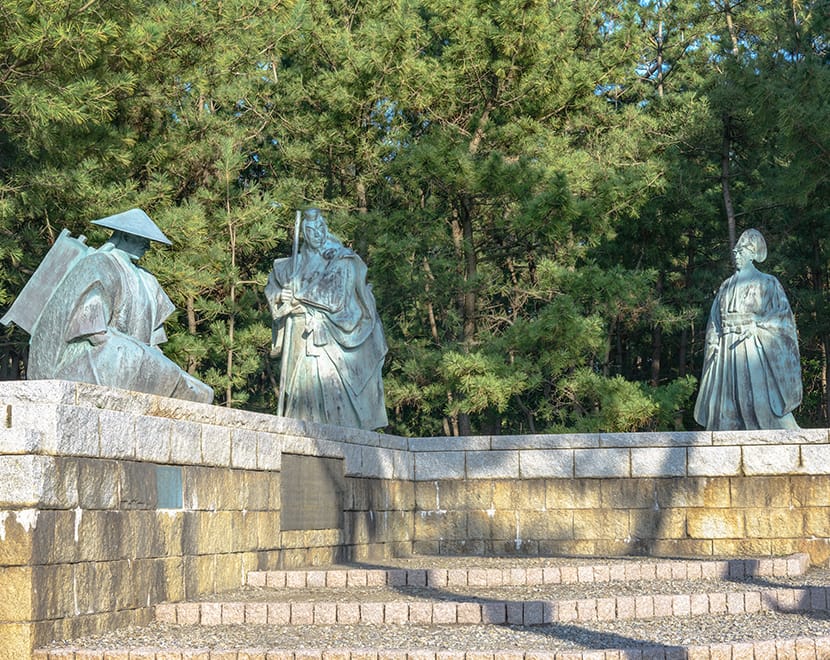
Music Notes
The ballad Ataka has a special place in the Tachibanakai repertoire. In many aspects, it is outstanding. First, with 213 lines it is by far the longest piece, almost double the length of a medium length ballad. A performance in its entirety lasts 35 to 40 minutes; even YAMAYAKI Kyokusui never performed the complete work on stage. With her representative 1979 LP recording with CBS Sony, which brought her awards and great fame in the traditional music world, she omitted 86 lines (11-13, 42-78, 93-109, 131-139, and 172-191) thereby reducing the piece to two thirds the full length. Despite this shortening, Ataka preserves its monumental expression, and is much more dramatic narration than flamboyant song.
There are astonishingly few instrumental interludes in this piece and the number of nagashi arioso patterns is also considerably lower than in most average-sized ballads. This structure led YAMAZAKI to create a unique, very rhythmical style of narration, which in some passages resembles rap for younger listeners. Nevertheless, it is only the constant flow of the new declamatory style that allows the drama to smoothly unfold over the lengthy span of times for its realization.
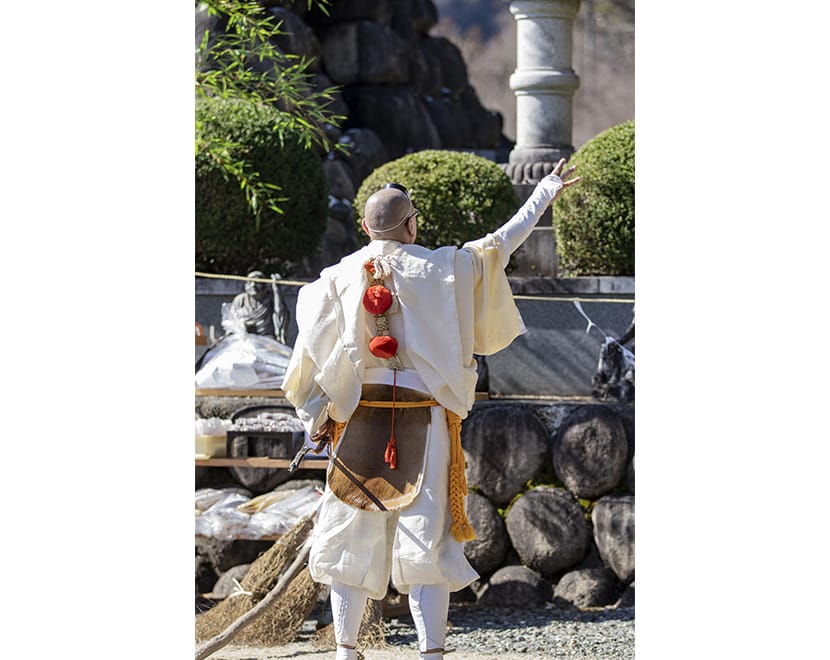
The low diversity of musical components in the narrative texture presents a huge challenge for the average performer. The piece is an adaption of the Noh play Ataka, and thus preserves clear roles. The presence of clear roles invites ensemble performances with four players: 1 the narrator, 2. Benkei, 3. the guardian Togashi and 4. Yoshitsune. Even with this division into four performers, one for each role, performances of the work in its entirety are extremely rare. The first performer to actually attempt playing the complete piece on stage is the National Treasure OKUMURA Kyokusui (1951-), YAMAZAKI Kyokusui’s finest student.
One detail of the piece that deserves special note is the dance song ennen in lines 202-205. Benkei opens with an imitation of Noh-utai, which, given the background of the composition, seems completely reasonable. In line 205, the right side of the text has the indication imayō, which refers the well-known melody of kurodabushi. Even if this melody appears only briefly, in the first half of the line “chiyo no sakae mo”, it is an immediately recognizable citation of a popular traditional drinking song. Its skillful presentation is also instrumental for the success of a performance.
